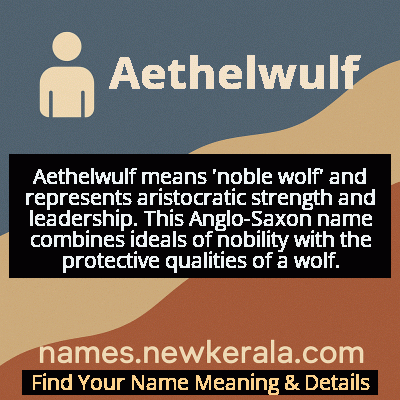Aethelwulf Name Meaning & Details
Origin, Popularity, Numerology Analysis & Name Meaning of Aethelwulf
Discover the origin, meaning, and cultural significance of the name AETHELWULF. Delve into its historical roots and explore the lasting impact it has had on communities and traditions.
Name
Aethelwulf
Gender
Male
Origin
Anglo
Lucky Number
5
Meaning of the Name - Aethelwulf
Aethelwulf means 'noble wolf' and represents aristocratic strength and leadership. This Anglo-Saxon name combines ideals of nobility with the protective qualities of a wolf.
Aethelwulf - Complete Numerology Analysis
Your Numerology Number
Based on Pythagorean Numerology System
Ruling Planet
Mercury
Positive Nature
Adventurous, dynamic, curious, and social.
Negative Traits
Restless, impatient, inconsistent, prone to indulgence.
Lucky Colours
Green, white.
Lucky Days
Wednesday.
Lucky Stones
Emerald.
Harmony Numbers
1, 3, 9.
Best Suited Professions
Sales, marketing, travel, entertainment.
What People Like About You
Versatility, charisma, adventurous spirit.
Famous People Named Aethelwulf
Æthelwulf of Wessex
King of Wessex
Ruled during Viking invasions, father of Alfred the Great, established strong Anglo-Saxon monarchy
Æthelwulf (poet)
Anglo-Saxon poet and cleric
Author of Latin poem 'De Abbatibus' describing monastic life in Northumbria
Æthelwulf (ealdorman)
Anglo-Saxon nobleman
Powerful ealdorman of Berkshire who fought alongside King Æthelred against Vikings
Name Variations & International Equivalents
Click on blue names to explore their detailed meanings. Gray names with will be available soon.
Cultural & Historical Significance
The name reflects the complex social hierarchy of Anglo-Saxon England, where noble lineage and martial prowess were equally valued. Its usage declined after the Norman Conquest as French names became fashionable, but it remains an important historical name representing England's pre-Conquest heritage. The cultural significance extends beyond England, as the name elements appear across Germanic languages, showing the shared cultural values of nobility and strength throughout early medieval Europe.
Extended Personality Analysis
Individuals named Aethelwulf are typically perceived as possessing natural leadership qualities, combining aristocratic dignity with fierce protectiveness. The 'noble' component suggests someone with strong principles, honor, and a sense of responsibility toward their community or family. Meanwhile, the 'wolf' element implies loyalty to their pack, strategic thinking, and the ability to be formidable when defending what they value.
This combination often results in people who are both dignified and determined, capable of making tough decisions while maintaining their integrity. They tend to be traditional yet adaptable, much like the historical figures who bore this name during turbulent times. Their strength lies in balancing civilized refinement with primal instinct, making them effective in both diplomatic and challenging situations. The name suggests someone who commands respect through both their character and their capabilities.
Modern Usage & Popularity
In contemporary times, Aethelwulf is an extremely rare given name, primarily used by parents with strong interests in Anglo-Saxon history or seeking distinctive traditional names. It appears occasionally in historical fiction and reenactment communities but has never ranked in modern baby name statistics. The name's complexity and old-fashioned sound make it challenging for modern usage, though simplified versions like 'Aethel' or 'Wulf' see slightly more frequent use. It's predominantly found in the UK, particularly in areas with strong Anglo-Saxon heritage like Wessex regions, and among genealogy enthusiasts tracing pre-Conquest ancestry.
Symbolic & Spiritual Meanings
The name Aethelwulf carries profound symbolic weight as a compound of two powerful Germanic concepts. The 'æthel' element symbolizes nobility not just in bloodline but in character - representing honor, excellence, and aristocratic virtue. The 'wulf' component embodies the wolf's symbolic attributes: loyalty to family or tribe, strategic intelligence, fierce protection, and survival instinct. Together, they create a symbolic archetype of the 'noble warrior' - someone who combines civilized virtues with primal strength. This duality represents the ideal Anglo-Saxon leader: cultured enough to govern wisely but fierce enough to defend their people, making the name a powerful symbol of balanced leadership.

